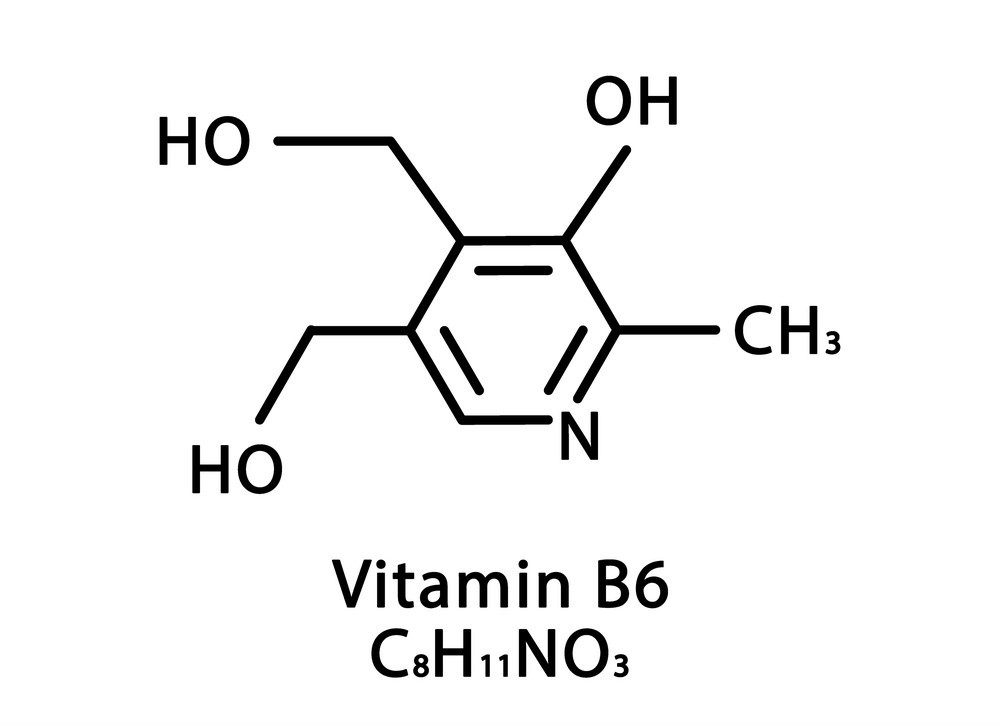
How ZMA Can Boost Your Immune System
Wondering how to boost your immune defences and fight against illness? Discover the science of ZMA and how it can help your immune system.

Every man looking to preserve his health and vitality, combat severe fatigue symptoms, and promote overall well-being needs to take a closer look at Vitamin B6, a key player in men’s health.
This essential micronutrient plays a vital role in everything from energy production to cognitive function to hormonal balance. Whether you’re aiming to fight tiredness, manage your weight, or improve your sleep quality, Vitamin B6 emerges as a potent ally in your health journey.
Having enough Vitamin B6 in your diet can significantly help curb extreme tiredness, a common symptom of several health conditions. It can also aid in weight loss, bolster your immune system, and even potentially reduce the risk of cardiovascular diseases.
Beyond these benefits, it is also recognised for its integral part in maintaining the normal functioning of our brains and nervous system, contributing to a better quality of sleep, and supporting mental health and mood regulation.
Our aim is to illuminate how Vitamin B6 can enhance your well-being, aid you in battling fatigue, keep you invigorated, and ensure you continue to operate at your prime.

Vitamin B6, also known as pyridoxine, is a vital micronutrient essential for many physiological functions in the body. It belongs to the B group of vitamins and plays a critical role in over 100 enzyme reactions, most of which are essential for optimising health. As it is water-soluble, it is not stored in the body and must be replenished regularly through our diet or supplements.

The National Institutes of Health’s (NIH’s) Recommended Daily Allowance of Vitamin B6 is 1.3 mg per day, for men aged 19-50 years.
As this intake is considered sufficient to meet the requirements of 97.5% of healthy individuals, values below this could potentially lead to increased health risks associated for said 97.5% of the population. this is particulalry true for those with bad lifestyle habits and a poor diet.

Vitamin B6 can be consumed from a variety of foods:
Even though dietary sources are available, many individuals may not get enough vitamin B6, making dietary supplements an efficient way to meet their nutritional needs.
We included vitamin B6 in our ZMAN+ supplement, to ensure our customers are able to reap the benefits of the vitamin and maintain their prime health.

Vitamin B6 offers numerous health benefits. They are summarised below.
Vitamin B6 has been shown to enhance energy, and reduce tiredness and fatigue. It does this through two mechanisms: increasing our ability to metabolise proteins, carbohydrates and fats, and aiding our ability to produce hemoglobin.
One of the key mechanisms by which Vitamin B6 contributes to giving us an energy boost is through its role in metabolism. Our metabolism is the engine that powers our body, transforming what we eat into usable energy.
As a coenzyme, Vitamin B6 is instrumental in over 100 enzyme reactions, many of which pertain to the metabolism of proteins, fats, and carbohydrates. In other words, it helps us get the most energy out of our food, which can prevent us from feeling tired.
The greater efficiency in the breakdown of macronutrients provides us with more energy, reducing fatigue, and preventing the slump we sometimes experience after meals.
This ability to maximise energy utilisation can also contribute to weight loss, as we are able to utilise the food we consume efficiently rather than storing it as fat.
Furthermore, the increased metabolic rate can lead to more calories burned, helping to create a calorie deficit essential for losing weight.

Vitamin B6’s role in reducing fatigue and tiredness isn’t limited to energy metabolism. It also plays a significant role in the production of hemoglobin, the oxygen-carrying protein in our red blood cells.
Hemoglobin is vital as our cells need oxygen to function effectively, especially during physical activity. Vitamin B6 aids in the synthesis of heme, an integral part of hemoglobin responsible for oxygen binding.
By boosting the production of hemoglobin, Vitamin B6 ensures our cells are continuously replenished with fresh oxygen, improving our energy levels and reducing the feeling of fatigue.
As a result, having enough Vitamin B6 can enhance our hemoglobin’s oxygen-carrying capacity, providing our cells with the oxygen they need.
This ensures that our muscles and other tissues have the oxygen necessary to perform optimally, helping to reduce fatigue and tiredness. When our tissues are sufficiently oxygenated, we are more energised, less likely to feel tired, and more capable of maintaining our physical and mental activities.
Vitamin B6 plays a vital and multifaceted role in the human body, notably in the functioning and regulation of our nervous system. This includes its involvement in the development and proper functioning of the brain, one of the body’s most complex and critical organs.
The essentiality of this vitamin in our diet comes from its central role in the creation of neurotransmitters, which are chemical messengers that facilitate communication between nerve cells.
These neurotransmitters are crucial in transmitting signals throughout our nervous system, ensuring that our bodily functions are coordinated and work as intended.
This essential communication facilitated by Vitamin B6 enables our nerve cells, and by extension our nervous system, to operate effectively and efficiently. As such, vitamin B6 is seen as a key player in maintaining a healthy nervous system and promoting optimal neural function.
Moreover, the role of Vitamin B6 goes beyond maintaining our current neural health. It’s instrumental in the growth and development of new neural connections, including those within our brain.

This development is paramount during formative years, but the role of Vitamin B6 in brain function persists throughout our lives.
This includes aiding in cognitive processes, supporting memory function, and contributing to our ability to learn new skills and information.
Perhaps one of the most concerning aspects of a deficiency in Vitamin B6 is the correlation with cognitive decline.
Numerous studies have demonstrated that inadequate levels of this essential vitamin can lead to a decrease in brain function over time.
Symptoms of this decline can range from mild cognitive impairment to more severe neurological health conditions, highlighting the importance of adequate Vitamin B6 intake in preventing such problems.
Deficiency doesn’t only present a risk for the future, it can also cause immediate issues. These can manifest as symptoms like fatigue, confusion, or depression, which can severely impact an individual’s daily life. For this reason, and many others, ensuring an adequate intake of this essential nurtient is vital.

The maintenance of a radiant and youthful complexion is intimately connected to Vitamin B6. Our skin, which is the largest organ in our body, can greatly benefit from the intake of this essential nutrient.
Vitamin B6 facilitates the production of collagen, a fundamental protein in our skin that contributes to its structure and elasticity. Collagen production not only provides a firmer and smoother appearance, but also aids in skin repair, combatting the effects of environmental damage and aging.
By helping maintain our skin’s elasticity, Vitamin B6 is instrumental in preventing the onset of wrinkles and fine lines, hallmarks of aging skin.
Furthermore, it encourages a vibrant complexion, supporting the skin in retaining its moisture and providing it with a natural, healthy glow.
As such, Vitamin B6 doesn’t just promote a youthful look, but actively contributes to the health and integrity of our skin.
Ensuring you are consuming sufficient quantities is, therefore, key for maintaining optimal skin health and making sure you remain in your prime.
Homocysteine is an amino acid found in the blood. Under normal circumstances, it doesn’t pose a health risk. However, when levels of this substance rise above the norm, it has been linked to an increased risk of heart disease, one of the most serious medical conditions prevalent in our society today.
Elevated homocysteine levels can often be an indicator of underlying health conditions that require immediate attention.
In combating this risk, Vitamin B6 emerges as a significant ally. It has been shown to aid in the reduction of homocysteine levels in the blood, thus mitigating the associated health risks.
Vitamin B6 assists in the metabolisation of homocysteine, transforming it into substances that are beneficial or at least harmless to the body.
The role Vitamin B6 plays in this critical process underscores its broader function in supporting cardiovascular health.
Apart from reducing homocysteine levels, Vitamin B6 also plays an essential role in maintaining general wellbeing.
This is especially important for those dealing with chronic conditions, as maintaining overall health can help alleviate other symptoms and improve quality of life.
Ensuring adequate intake is thus critical not only for those specifically looking to reduce their homocysteine levels but also for those seeking to enhance their overall health.

A fully functioning immune system is crucial to our overall health and the protection of the human body from various infections.
A robust immune response requires the creation of antibodies, tiny warriors of the immune system, and white blood cells, the body’s first line of defence against harmful pathogens.
One essential nutrient that aids in the production of these vital components of the immune system is Vitamin B6, also known as Pyridoxine.
The roles of this crucial nutrient in immune function extend beyond mere antibody production. It also contributes to the development of white blood cells, which include different types of cells, each with their specialised functions.
Some recognise invaders and sound the alarm, while others destroy harmful pathogens. A deficiency in this key nutrient could impair the formation and response of these cells, weakening the immune system, and potentially leaving the body more susceptible to infections.
An underlying medical condition can often impair the immune system’s function. This makes it even more crucial to ensure the body is provided with all the necessary tools to fight back, one of which is Vitamin B6.
By maintaining an adequate level of this nutrient in the body, it can support a robust immune system capable of mounting a strong defense against infections.
Lifestyle factors can also influence the body’s immune response. Stress, lack of sleep, poor diet, and sedentary behavior can all weaken the immune system over time.
However, a regular intake of this vitamin can help counter these negative effects by bolstering the immune response, which can then fight off infections more effectively.
It’s not just about managing the symptoms that arise when an infection strikes, but also about preventing the infection from progressing into a more serious health problem.
By ensuring that your diet or supplements provide an adequate amount of this nutrient, you’re taking an important step towards maintaining a strong immune system and, consequently, achieving optimal health.
Our brains use neurotransmitters like serotonin and dopamine to regulate emotions.
Serotonin often provides us with feelings of relaxation and happiness, while dopamine acts as our natural reward system, driving motivation and providing a sense of achievement or desire.

Vitamin B6 plays a critical role in the synthesis of these key neurotransmitters. Through its pivotal involvement in neurotransmitter production, it helps to maintain a balanced emotional state and overall mental health.
Consequently, Vitamin B6 has been shown in studies for its potential to alleviate symptoms of anxiety and depression, some of our society’s most common mental health challenges.
Another neurotransmitter that Vitamin B6 helps synthesise is GABA (gamma-aminobutyric acid), an inhibitory neurotransmitter that reduces neuronal excitability and induces relaxation.
Having adequate levels of GABA is important as it assists us in feeling relaxed and combating anxiety, a common cause of emotional distress.
Moreover, through its action on these neurotransmitters, Vitamin B6 not only supports mood regulation during waking hours, but also promotes restful sleep.
This results in individuals waking up feeling refreshed, further amplifying its beneficial impact on mood and overall mental wellbeing. As such, the supplementation of Vitamin B6 could provide significant support in managing mood, anxiety, and depression.

Vitamin B6 plays a crucial role in the creation and regulation of hormones. These include hormones that significantly influence mood, stress response, and the crucial cycle of sleep. It actively contributes to the maintenance of hormonal balance, playing an indispensable role in the comprehensive performance of the endocrine system.
Its importance in hormone regulation isn’t just theoretical; multiple research studies have affirmed this, demonstrating the hormone-supporting benefits of Vitamin B6.
The evidence of which has created legal precedence for Vitamin B6 supplements utility in promoting hormonal balance.
This is particularly noteworthy for men, where hormonal problems can manifest in various ways, including mood swings, weight gain, and sleep disturbances.
To remain at peak performance and uphold hormonal health, it’s vital to ensure a sufficient intake of Vitamin B6. By incorporating adequate amounts of this vitamin in your diet, you can help your body optimise its hormonal balance and support your overall wellbeing.
In addition to all the benefits listed above, vitamin B6 also plays a role in testosterone production and regulation, crucial to male health.
Research suggests that adequate vitamin B6 intake can help maintain healthy testosterone levels, contributing to a range of benefits, from physical strength to contributing to overall male health, the ability to lose weight, and avoid fatigue and other health conditions.
A study highlighted that a deficiency of vitamin B6 could lead to decreased testosterone levels in the blood, suggesting that maintaining appropriate levels of this vitamin is essential for preserving normal testosterone.
Moreover, beyond muscle development and sexual health, testosterone regulation, supported by vitamin B6, contributes to bone density, red blood cell production, and mood stability.

This page has delved into the myriad health benefits of Vitamin B6, highlighting its pivotal role in everything from boosting energy and reducing fatigue, to supporting cognitive function, maintaining skin health, and regulating mens hormones. It underscores the significance of maintaining optimal Vitamin B6 levels for overall health and well-being.
We utilised Vitamin B6 in our original ZMAN+ supplement formula, specifically to enable men to optimise their health. Incorporate it into your daily routine to reap the benefits and remain in your prime.


Wondering how to boost your immune defences and fight against illness? Discover the science of ZMA and how it can help your immune system.

Learn how ZMA can transform your muscle recovery and athletic performance, allowing you to reach your health goals

Studies have shown that testosterone levels are falling. Read this to find out why and what can be done to fix it.

Discover how Vitamin B6 reduces fatigue through energy metabolism, with key facts and intake recommendations.

Complete the form NOW to receive the free ebook and take on the challenge.